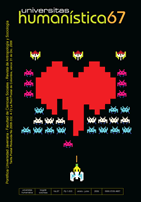Resumo
Concierto barroco, como muchas de las novelas de Alejo Carpentier, es un testimonio histórico presentado en forma de una hélice. Los protagonistas, Filomeno y el Amo, aparecen en una progresión musical desde la época barroca pre-clásica hasta el principio de los años 70. La sabiduría práctica y popular de Filomeno y la identidad confusa de el Amo producen una semejanza obvia a don Quijote y Sancho Panza. Aunque los dos atestiguan los mismos sucesos, sus interpretaciones son completamente diferentes ycoloridas por sus orígenes sociales. En ambas novelas, mientras la mirada del protagonista noble está centrada en el pasado medieval, su compañero de origen popular le enseña el buen camino, ofreciéndole la posibilidad de encontrarse a sí mismo.

A revista Universitas Humanística encontra-se registada sob a licencia Creative Commons Versão 4.0 Internacional. Portanto, esta obra pode se reproduzir, distribuir e comunicar publicamente em formato digital, sempre que dado o crédito apropriado para os autores e a Pontificia Universidad Javeriana. Permite-se citar, adaptar, remixar, transformar, autoarquivar, republicar e criar a partir do material, para qualquer fim, mesmo que comercial, sempre que indicado apropriadamente o nome do criador, provido um link para a obra original e indicado se mudanças foram feitas. A Pontificia Universidad Javeriana não retém os direitos sobre as obras publicadas e os conteúdos são responsabilidade exclusiva dos autores, os quais conservam seus direitos morais, intelectuais, de privacidade e publicidade.
O aval sobre a intervenção da obra (revisão, correção, edição, tradução, formatação) e a subsequente difusão disponibiliza-se através de licença de uso e não através de transmissão de direitos, o que representa que a revista e a Pontificia Universidad Javeriana são isentas de qualquer responsabilidade que puder se derivar de uma prática ética pobre por parte dos autores. Em consequência da proteção fornecida pela licença de uso, a revista não fica na obrigação de publicar retratações ou alterar informações já publicadas, a não ser que a errata seja decorrente do processo de gestão editorial. A publicação de conteúdos nesta revista não representa royalties para os contribuintes.


